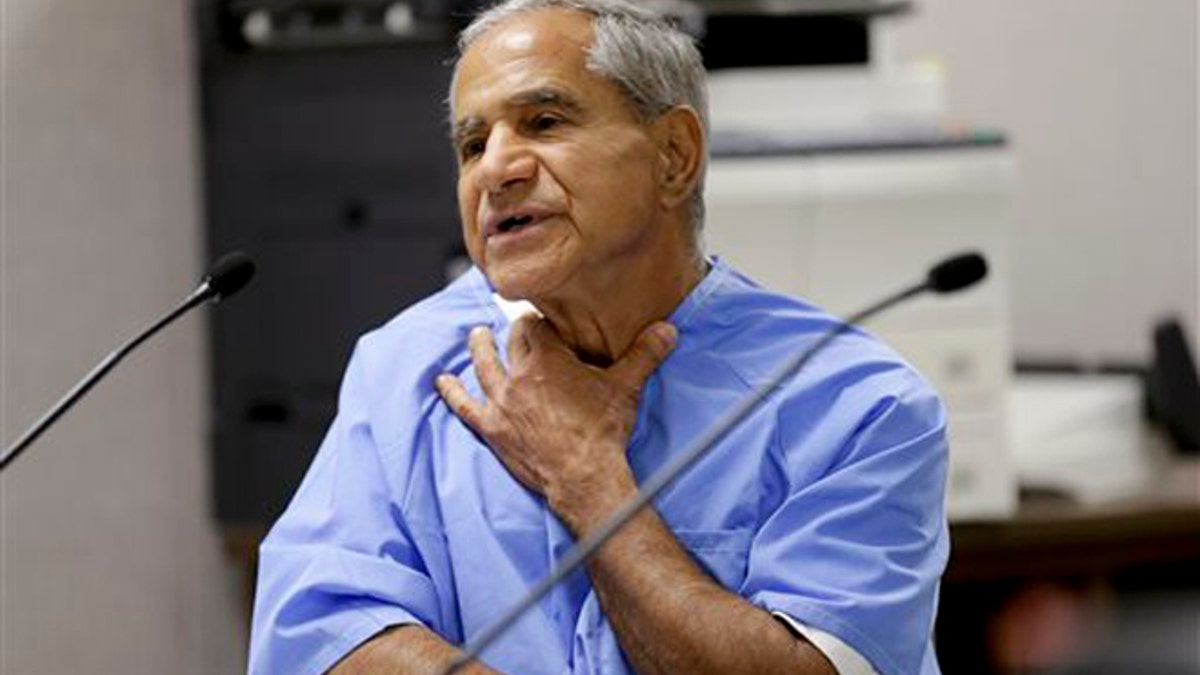
Sirhan Sirhan describes being choked during a parole hearing Wednesday, Feb. 10, 2016, at the Richard J. Donovan Correctional Facility in San Diego. For the 15th time, officials denied parole for Sirhan Sirhan, the assassin of Sen. Robert F. Kennedy, after hearing Wednesday from another person who was shot that night and called for the release of Sirhan. (AP Photo/Gregory Bull, Pool)
SAN DIEGO – For the 15th time, officials denied parole for Sirhan Sirhan, the assassin of Sen. Robert F. Kennedy, after hearing Wednesday from another person who was shot that night and called for Sirhan's release.
The decision came after Sirhan answered questions from the California parole panel for about three hours in a small, windowless conference room.
Commissioners concluded Sirhan did not show adequate remorse or understand the enormity of his crime.
"This crime impacted the nation, and I daresay it impacted the world," commissioner Brian Roberts said. "It was a political assassination of a viable Democratic presidential candidate."
During the hearing, the 71-year-old Sirhan stuck to his previous account that he did not remember the shooting in 1968 at the Ambassador Hotel in Los Angeles after Kennedy won the Democratic presidential primary in California.
He said he recalled being in the hotel then going to his car and returning after realizing he had too much to drink. He said he became interested in a female and they drank coffee in a hotel pantry.
"It's all vague now," Sirhan told the parole panel. "I'm sure you all have it in your records, I can't deny it or confirm it, I just wish this whole thing had never taken place."
Sirhan, a native of Jerusalem, listened intently during most of the hearing, turning testy when commissioners pressed him on his memory. He said he felt remorse for any crime victim but added that he couldn't take responsibility for the shooting.
"If you want a confession, I can't make it now," Sirhan said. "Legally speaking, I'm not guilty of anything. ... It's not that I'm making light of it. I'm responsible for being there."
Sirhan said incriminating statements he made at trial were the result of an ineffective defense attorney who pressured him into thinking he was guilty.
Paul Schrade, now 91, told the panel that he believes Sirhan shot him at the hotel but an unidentified second shooter killed Kennedy. Schrade was a Kennedy confidante who was one of five people injured in the shooting.
Schrade pleaded for the release of Sirhan at the hearing and apologized to him for not doing more over the years to secure his freedom.
Schrade's voice broke with emotion at times during his hour of testimony that recounted his efforts to unravel questions about the shooting of Kennedy.
"I forgive you for shooting me," Schrade told Sirhan. "I should have been here long ago and that's why I feel guilty for not being here to help you and to help me."
The two men faced each other for the first time since Schrade testified at Sirhan's 1969 trial. Schrade repeatedly apologized for not attending any of Sirhan's previous 14 parole hearings.
Sirhan nodded politely each time Schrade sought his forgiveness.
Schrade showed flashes of anger against Roberts, who admonished him for violating protocol by addressing Sirhan directly.
Schrade also criticized a representative of the Los Angeles County district attorney's office for making what Schrade called a "venomous" statement against the release of Sirhan.
Roberts at one point asked Schrade to wrap up his presentation, saying "quite frankly, you're losing us."
"I think you have been lost for a long time," Schrade shot back.
Earlier in the hearing, the commissioner asked if anyone wanted a break. Schrade spoke up from the audience and said, "no I want this to get over, I find it very abusive."
Sirhan told the panel that he initially didn't plan to attend the hearing but appeared at the urging of his attorneys.
If released he said he hoped he would be deported to Jordan or live with his brother in Pasadena, California.
His hope, he said, was "just to live out my life peacefully, in harmony with my fellow man."
"This is such a traumatic experience, it's a horrendous experience that for me to keep dwelling on it is harmful to me," Sirhan said.

